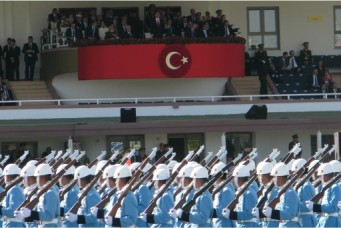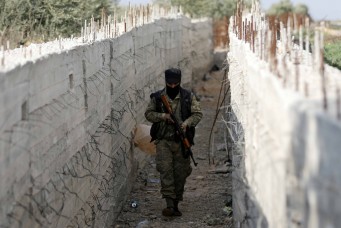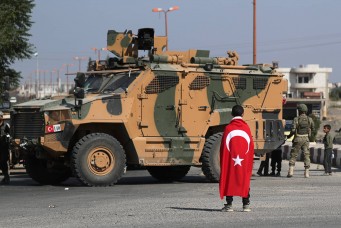Lessons from the Turkish Coup Attempt
Turkey’s failed coup attempt suggests the military’s political role has reached a nadir, but politicization of the institution continues.
The shockwaves that followed the coup attempt in Turkey on July 15 suggest that Turkish society has developed a strong resistance to one of the most important traditional roles of the military: intervention in civilian politics. The wide array of theories and explanations for the coup attempt indicate the extent to which observers were caught off guard by the reappearance of the military in internal politics. The Turkish Armed Forces’ (TAF) involvement in the bitter rivalry between President Recep Tayyip Erdogan and the reclusive cleric Fetullah Gulen is the climax of a power struggle whose casualties now include all those in opposition to the ruling regime. The coup attempt may itself signal the death throes of a military that has seen its formal power diminish and its sociopolitical position decline as a result of purges (and attendant humiliations) that have successively damaged the TAF’s esprit de corps, weakening the junior officers’ loyalty to the high command throughout the nearly fifteen-year rule of the Justice and Development Party (AKP). Yet despite the military’s internal divisions and weakening political role, the coup attempt is also a reminder to the regime that a politicized military poses a threat that needs to be carefully controlled.
The founding myth of the Turkish state revolves around the military, which staved off foreign occupation and carved out a modern republic out of the remains of a weakened Ottoman Empire. The protection of the state’s ostensible secularity and integrity relegated the military to a guardianship role, resulting in four direct interventions in civilian political life between 1960 and 1997, justified each time as saving the state. The armed forces had no intention of remaining in power, each time returning the state to civilians, albeit in a modified form, leading one historian to describe them as “reluctant interventionists.” This was partly a consequence of the Turkish high command’s fear that retaining power would politicize the military, creating divisions within the TAF and thereby undermining the cohesion and power of the institution.
Like the latest coup attempt, the first coup in 1960 was set in motion by junior officers acting outside the chain of command. Yet the coup in July came as a shock for scholars of the Turkish military, who believed that the military’s days of direct physical interventions were over. Instead, many expected future interventions to follow a less direct model, such as the “e-memorandum” or “e-coup” attempt in 2007, when the TAF issued a warning on its official website from then-Chief of General Staff Yasar Buyukanit urging the population to mobilize against the ascension of AKP Foreign Minister Abdullah Gul to the presidency. That “e-coup” failed when the AKP retaliated by calling an early election and winning overwhelmingly, whereupon Gul became president in August 2007. This should have been a clear message to the TAF that they had lost the political influence to successfully carry out interventions against popularly elected governments and would only diminish their credibility by trying.
Until the AKP’s ascendancy, the military’s multiple interventions had created a form of co-dependency: politicians were able to get away with being irresponsible because the electorate accepted the military’s “caretaker” role of staging a coup when things got too bad, and the military’s periodic coups reinforced their position as guardians of the state. It was a vicious circle that hindered the development of a mature democracy. It also exalted the military as a political force that maintained a national vision, but relegated the day-to-day of Turkish political life to other branches. Indeed, when the AKP won the 2002 general elections, carried by a protest vote against the ineffectual ruling elite, many secularists consoled themselves with the thought that the military would serve as a disciplining counterbalance in place of the weak and discredited opposition.
Yet the AKP’s rule marks the beginning of the decline of the military’s power. The AKP’s early successes, in particular the growth of the Turkish economy and with it the country’s international stature, instilled more trust in civilian political actors while giving a voice to a rising class of religious conservative voters. At the time, the government’s commitment to European Union membership and its need to fulfill the Copenhagen criteria—including imposing civilian political control over the armed forces—weakened the military’s formal powers. Through the Ergenekon and Balyoz (Sledgehammer) trials, which allegedly exposed anti-government conspiracy plots, the AKP sought to uproot what it regarded as the “deep state” within the military, seen as a Kemalist counterforce against the elected government. From 2007 to 2011, this resulted in the conviction of over 300 people—including journalists, academics, and retired and active duty military officers of various ranks—on blatantly trumped-up charges. The military leadership did not support the politically targeted officers, fostering resentment throughout the institution and weakening institutional cohesion. At the same time, though the military claimed institutional legitimacy from the people’s support, there was no mass mobilization among the people to support these officers either.
Yet this decline of the military’s political role did not ultimately result in greater democracy. Without a real political opposition, the loss of the military’s “disciplining power” gave the ruling party free rein. Political opposition to the AKP (and to Erdogan specifically) instead manifested in the Gulen movement, a transnational religious network led by Fetullah Gulen, whose support had been key to President Erdogan’s rise. Erdogan removed Gulenists from the AKP lists for the 2011 general elections, and their falling-out continued unabated, with Erdogan seeking to maintain the upper hand by purging Gulen sympathizers from key positions in the bureaucracy, judiciary, and police. The Gulenists were allegedly behind the much-publicized corruption probes against Erdogan and his cabinet ministers in December 2013.
The rivalry between the two inevitably also extended into the military, where Gulenists had reportedly sought to establish themselves since the 1980s, encouraging their students to enroll in officer training schools. When the Gulenists and the AKP were allied, the Ergenekon and Sledgehammer trials had served to strengthen their position within the military by clearing Kemalists out of the way. However, by 2015 the AKP widely claimed these trials were the work of the Gulen movement alone, and all suspects jailed in the Sledgehammer trials were released on procedural errors—a move by Erdogan to rebuild support within the military while discrediting his new foe.
Since 2014, Erdogan has sought to re-forge an alliance with the military against the Gulen movement. Moreover, the worsening security situation on Turkey’s southern borders, as well as the failure of the peace process with the PKK, has once again given the military a more central role in maintaining the “integrity” of the republic. Yet the AKP is well aware of the internal divisions within the military that could weaken this alliance, and is doing its best to ensure that the anti-Gulen factions are the ones most benefiting from the military’s strengthened security role. Following the coup attempt, Erdogan announced on July 21 that the TAF is to be “restructured.” Already 1700 military personnel have been dishonorably discharged, including 40 percent of Turkey’s admirals and generals. All military academies are due to be shut down, and the TAF will be under the command of the defense minister, allowing for greater government control. The AKP’s lessons from the coup attempt are clear: if it wants a politicized military that will help advance the party’s own interests, it will require careful control not to lead to another coup.
This article is reprinted with permission from Sada. It can be accessed online here.
Pinar Tank is a senior researcher at the Peace Research Institute Oslo (PRIO).
Subscribe to Our Newsletter






